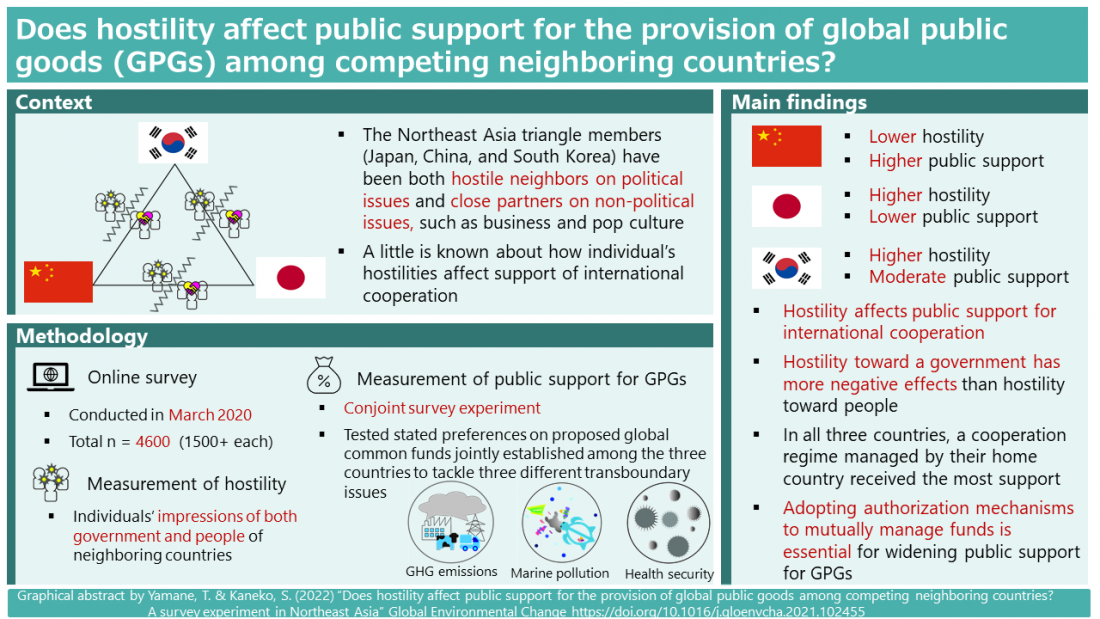Scientists from Hiroshima University provided new scientific evidence on effects of hostility toward neighboring countries.
A scientific sociological survey of public attitudes found that ongoing mutual hostility amongst Chinese, Japanese and South Korean publics negatively impacted support for regional governance of so-called global public goods such as climate mitigation and pandemic management, but if mutually managed, that opposition could be turned around.
The findings were published in the journal Global Environmental Change on January 22, 2022.
Climate change, a threat to human well-being across the planet, has placed the issue of cross-border cooperation and even global governance at the forefront of political considerations. The Covid-19 pandemic and related issues of infectious disease monitoring, equitable vaccine distribution and global intellectual property management have only enhanced the prominence of governance of what could be called ‘global public goods.’ There are many others, from near-Earth object surveillance to nitrogen pollution and plastic waste.
However, even as the world’s politics, cultures and economies integrate, there is also pushback toward globalization from many quarters. Britain’s vote in favor of exit from the European Union and former US president Donald Trump’s withdrawal from the Paris Agreement climate treaty, and the re-emergence of a nationalist populism in some countries in eastern Europe, Latin America and south Asia are perhaps the most prominent examples.
The three countries of the “Northeast Asian Triangle,” the People’s Republic China, Japan and South Korea, offer examples of both the integrating and pushback tendencies with respect to cross-border issues. They have implemented close cooperation and exchange across multiple non-political areas such as business, tourism, education and even pop culture, and for nearly a decade the three nations have participated in the Trilateral Cooperation Secretariat — an ‘EU-lite’ international organization aimed at developing peace and common prosperity in the region. At the same time, historical military-political disputes and growing political and economic rivalry continue to characterize relations among these countries.
“Much research has been performed examining the political constraints to cross-border cooperation to manage global public goods, very little work has been done investigating how hostility amongst the populace of a country itself with respect to neighboring countries affects support for mechanisms of governing and investment in global public goods,” says Shinji Kaneko, director of Hiroshima University’s Network for Education and Research on Peace and Sustainability (NERPS).
So the researchers carried out a comprehensive survey with large sample sizes (4600 respondents in total) on public attitudes toward global public goods in each of the Northeast Asian Triangle nations. The investigators used three examples of such goods: climate change mitigation, marine pollution management (especially related to plastics), and pandemic cooperation. The surveys were carried out shortly after the World Health Organization had declared the global Covid-19 pandemic.
The researchers found that substantial mutual hostility existed in all three countries. “We expected this given current disputes such as those over the South China Sea,” said Tomomi Yamane, lead author on the survey and researcher with NERPS.
“But it’s in the details of the hostility where we find a silver lining: information that might help show how cross-border global public good governance systems can still be built despite such antagonisms.”
They found that Chinese people had lower hostility towards neighboring countries while hostility was higher among Japanese and South Koreans. This hostility toward neighboring countries did indeed negatively impact public support for global public goods. The higher hostility toward neighboring countries was, the lower the support of cross-border cooperation was likely to be.
However, there were marked differences in the levels of hostility toward a country’s government compared to its people, and hostility toward the government had more negative effects than hostility toward people.
To use the example of the establishment of a global public fund to support any one of the global public goods issues. They found that if such a fund were managed by a neighboring country, the establishment of the fund received strongly lower public support right across the Northeast Asia triangle. But a fund that was monitored by an independent internal or external committee with decision-making carried out by unanimous or majority agreement — in other words, democratic governance advised by experts — received favorable public support.
Moving forward, the researchers hope to extend their investigation and analysis to other nations with the aim of providing an evidentiary grounding to what mechanisms of international cooperation and management of global public goods are most viable.
##
About Hiroshima University
Since its foundation in 1949, Hiroshima University has striven to become one of the most prominent and comprehensive universities in Japan for the promotion and development of scholarship and education. Consisting of 12 schools for undergraduate level and 4 graduate schools, ranging from natural sciences to humanities and social sciences, the university has grown into one of the most distinguished comprehensive research universities in Japan.
English website: https://www.hiroshima-u.ac.jp/en



